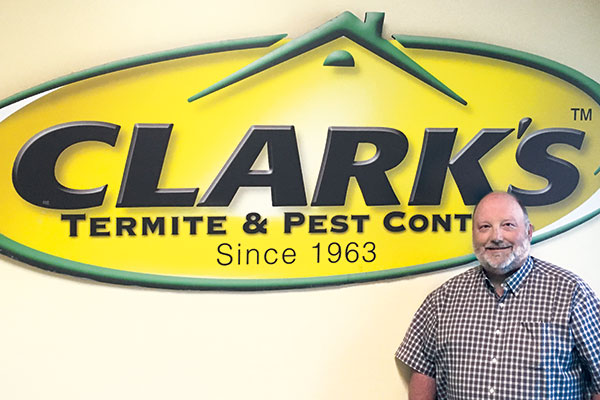Clark’s mosquito management marketing nets add-on business and new clients.

Alan Wilson, entomologist and technical director for Clark’s Termite & Pest Control
Photo: Clark’s Termite & Pest Control
Most of the pest management companies in South Carolina offer mosquito management services, and Clark’s Termite & Pest Control in Irmo is no exception. Entomologist and Technical Director Alan Wilson says it’s an add-on service that pays in more ways than one.
“If they’re a current customer, it’s a service we can add on so they can see immediate results. It just bolsters that customer loyalty,” he says. “If they’re not current customers and they sign up for mosquito services, you’ve got opportunities to offer them other services if you do a good job.”
Clark’s technicians performing general pest management are trained to give current customers fliers that detail the company’s mosquito management services and the different treatment programs available.
Exhibiting at home shows helps the company attract new customers. Clark’s leverages social media to let customers know which local events staff will attend. For those who surf the web to learn more about the company, a page on its website is dedicated to its mosquito management services.
Wilson says the majority of the company’s mosquito management services are for residential customers. Business has really taken off over the past five years, and has been steadily growing every year since.
Will the recent news reports about the Zika virus translate into more sales this year? Perhaps, Wilson says.
“Being out in the field and giving presentations to different groups, I am getting questions about Zika,” he adds. “It remains to be seen how much of an effect it’s going to have on the number of mosquito services we do.”
Typically, the most prevalent species in the company’s service area are Aedes aegypti, which transmits the Zika virus, yellow fever, dengue and chikungunya, and the Asian tiger mosquito (A. albopictus). Along the Carolina coast, the floodwater mosquito (A. vexans) and the salt marsh mosquito are also common, Wilson says. During mosquito season, Clark’s technicians break out their backpack blowers for adulticide treatment.
Customers choose either a one-time service, a three-service program, or a five-time plan with one free treatment that brings the total to six services. Treatments are guaranteed for 30 days.
Wilson says the company is careful to tell customers that treatment provides a suppression, not an elimination, service.
“We tell them we’re not going to eliminate mosquitoes,” he says. “You’re going to see some. We just want you to see fewer.”
Because you never know what the problem might be — the neighboring property or a patch of vegetation, for example — Clark’s requires its technicians to use smartphones to take pictures of conducive conditions.
“We want pictures of the yard to try and determine what might be the cause of a callback,” Wilson says.
An important part of the treatment is education, he adds. Technicians are trained to walk around the property to seek out standing water that would hinder treatment, and bring it to the customer’s attention.
“A lot of customers know about the bigger items, like birdbaths and tires, that hold a lot of water,” Wilson says. “But they don’t realize that the smaller things, like a can or a knothole in a tree, can hold enough water to produce mosquitoes.”
Wilson predicts that last fall’s heavy rains and flooding could mean more mosquitoes this season. Wet weather in South Carolina is a common challenge.
“You’re always watching the weather, trying to get treatments in around the rain,” he says.
Managing Editor Diane Sofranec can be reached at dsofranec@northcoastmedia.net or 216-706-3793.
PMP 2016 Mosquito Management Survey
Leave A Comment